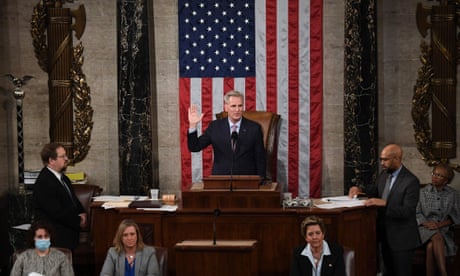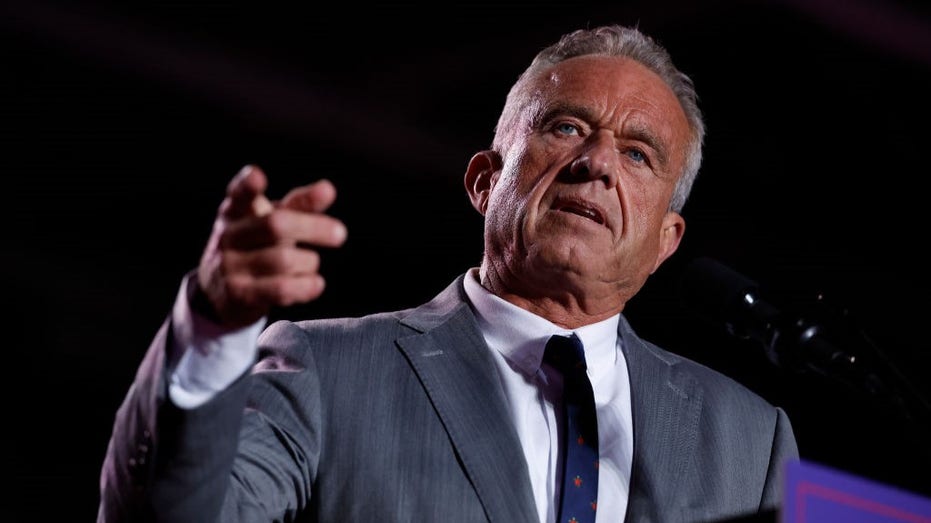- by foxnews
- 08 Apr 2025
McCarthy clinches speaker’s gavel at 15th attempt as Republicans in disarray
McCarthy clinches speaker’s gavel at 15th attempt as Republicans in disarray
- by theguardian
- 10 Jan 2023
- in politics

He had nothing to lose but his dignity. Congressman Kevin McCarthy knew the job he had always craved was within his grasp. All he needed was the vote of a 40-year-old Florida man under investigation over sex trafficking allegations.
McCarthy walked over and begged Matt Gaetz to make him speaker of the US House of Representatives. Gaetz stared, pointed a finger and refused. Fellow Republican Mike Rogers stormed towards Gaetz and had to be forcibly restrained.
That this tragicomedy played out on the second anniversary of the deadly January 6 attack on the US Capitol was almost too on the nose. That it was Gaetz, an ardent supporter of Donald Trump and smash-mouth media performer, who held McCarthy's fate in his hands said everything about the Republican party in 2023.
Midnight tolled, and within an hour McCarthy had achieved his dream of becoming speaker, securing a majority of votes from those present at the 15th attempt in the longest such election since the civil war. He beamed, punched the air and waved the gavel with childlike enthusiasm. "That was easy, huh?" he said. "I never thought we'd get up here." But at what cost?
After a historic humiliation, it was a pyrrhic victory. With a wafer-thin majority, and having surrendered numerous powers to far-right rebels so they would drop their opposition, McCarthy is set to be one of the weakest speakers in history.
His concessions reportedly included allowing a single member to call for a vote to remove the speaker, putting him at risk of a shorter tenure than Liz Truss's 50 days as British prime minister. He also offered key committee positions to the House Freedom Caucus, granting them outsized influence and raising the spectre of chaos for the next two years.
The former Republican National Committee chairperson Michael Steele told the MSNBC network: "If it does come to, God forbid, a shutdown of the government, the American people have only one place to look and that is the man right there on our screen right now who gave away the House so he could take a seat."
The late-night drama capped a torrid week in which liberals indulged some guilt-free schadenfreude as the Republican party ate itself on live television, unable to coalesce around a choice for the position that is second in line in the presidential succession.
The old House chamber resounded with a hubbub of voices, fiery speeches, shouts of "McCarthy" and "Jeffries" [Democratic leader Hakeem Jeffries], chants of "Hakeem! Hakeem!", roars of "Yea!" and "No!" to decide adjournments, the wails of babies (some members brought the families and, in one case, a pet dog) and, 14 times over, House clerk Cheryl Johnson uttering the words, "A speaker has not been elected."
Joe Biden described the saga as an "embarrassment". For McCarthy, it was like a recurring nightmare. Nominating him on the sixth ballot, Florida Congresswoman Kat Cammack said: "Well, it's Groundhog Day."
Trapped in a time loop, the elected representatives to the House could not be sworn in, leaving the lower congressional chamber in suspended animation. But still the Capitol hummed with tourists, reporters and banks of TV cameras. Trolleys of pizza rolled along marble corridors to sustain late-night negotiations behind closed doors.
Commentators interpreted the disarray as evidence of a new generation of conservative Republicans, many aligned with Trump's "Make America great again" (Maga) base, who want to upend business as usual in Washington. It also suggested that the former president has unleashed anti-establishment forces that even he can no longer control.
McCarthy had initially condemned Trump over the January 6 attack but, before the month was out, went cap in hand to his home in Florida to pledge his fealty. In turn, Trump supported McCarthy for the speakership but the gesture appeared half hearted; notably the former president did not round on McCarthy's opponents with his customary insults and nicknames.
As the voting went on and on, Congresswoman Lauren Boebert of Colorado, a conservative firebrand, noted that "her favourite president" had called on the anti-McCarthy holdouts to "knock this off". But she went on: "I think it actually needs to be reversed. The president needs to tell Kevin McCarthy, 'Sir, you do not have the votes and it's time to withdraw'." The show of defiance prompted a loud "Oooh!" from many in the House.
Speaking by phone on Friday morning with the House still in limbo, Newt Gingrich, a former Republican speaker, said: "It was very significant that these people who call themselves Trump supporters just shrugged off his endorsement of McCarthy. That was a significantly different reaction than he would have gotten a year or two ago. It certainly means he's weaker than he was. He must have been very surprised by how casually they rejected him."
Some of the rebels' motives would have been very familiar to Trump: money. Several McCarthy opponents used the stalemate as an opportunity to send out fundraising appeals. Gaetz's campaign asked donors to "support our fight with critical reinforcements" and branded McCarthy "Kyiv Kevin" - a reference to his support for Ukraine. Congressman Andy Biggs of Arizona urged donors "to turbocharge our emergency efforts to break the establishment".
Gingrich commented: "There is a wing of the Republican party which is very unhappy with Washington and that wing makes it profitable for some members to be very disruptive. If you look at Gaetz and Biggs, they're making money every day this goes on because they're sending out fundraising appeals by email, so they have a big vested interest in keeping it going. If you look at others, this is their chance to maximise their leverage."
He warned that this is "the most dangerous period" for Republicans since a divisive 1964 party convention that saw moderates facing off against conservative insurgents. But there are some critics who argue that Gingrich himself planted the seeds of the current crisis, pointing to his partisan shock tactics as speaker in the 1990s that transformed politics into a blood sport (a charge he vehemently denies, pointing to several bipartisan accomplishments during the Bill Clinton White House).
The next mutation was the Tea Party in 2010, a grassroots conservative movement that endorsed small government and fed a racist backlash against President Barack Obama. Republican speakers including John Boehner had trouble fending off a rebellious right flank and ended up with government shutdowns, standoffs and early retirement.
The right was further empowered by the rise of Trump and went on to adopt his style of performative populism. A majority of the members opposing McCarthy this week voted to overturn the 2020 election. Yet party leaders have repeatedly acquiesced to their demands rather than seeking to hold them accountable.
Former Republican Capitol Hill communications director Tara Setmayer said: "The Maga wing are political nihilists and that's evidenced by their behaviour and their demands. They've been rewarded for being political trolls, not professional elected officials who govern for the best interest of their constituents. This is all about political kabuki theatre and fundraising for them."
Many of the holdouts represent overwhelmingly majority Republican districts, Setmayer noted, and cannot be bought off with promises of infrastructure projects to impress voters. She added, "Bringing the bacon home to their districts? That is not the currency that the Maga wing operates in today's political climate. In the era of Trumpism it's attention, viral moments, media hits on Fox News and Steve Bannon's podcast. The grift is the political currency."
Setmayer, a senior adviser to the Lincoln Project, an anti-Trump group, warned that these are ominous signs for the coming Congress, saying: "The Republican party is incapable of governing like grownups in Washington and that's unfortunate because it [affects] the entire country.
"If you listen to what a lot of these Republicans are saying, their focus is on personal agendas and vendettas against Democrats or the Biden administration. They want to focus on nonsense like endless spurious investigations into Hunter Biden and the Department of Justice and the 'deep state' and Dr Fauci and relitigating Covid policies. This is all backward thinking, not putting a focus on real issues that impact Americans every single day. It's going to be chaos. Chaos is their currency."
The power of the far-right extremists could jeopardise crucial agenda items such as passing a budget and lifting the debt ceiling limit to cover previously authorised spending.
Bill Galston, a senior fellow at the Brookings Institution thinktank in Washington, said: "I believed from the start that this would be a period of minimum legislative productivity and nothing that's happened in the past four days has changed my mind. But this is a game for very high stakes because these people could blow up the world financial system if they're not careful."
Democratic strategist Kurt Bardella agreed. "We're going to have nothing but internal strife and gridlock within the Republican party that will create a dysfunctional House of Representatives," he said. "This is what happens when you allow someone like Donald Trump to hijack an entire party, someone who only traffics in lies and conspiracy theories."
Republicans' identity crisis looks set to persist. Disappointing midterm election results suggested that Trump's influence may be waning as he again seeks the party's presidential nomination. But the decline of a strongman can create a leadership vacuum and fresh uncertainties. This week saw allies such as Gaetz and Marjorie Taylor Greene on opposing sides and drove a wedge between Fox News hosts Tucker Carlson and Sean Hannity.
Larry Jacobs, director of the Center for the Study of Politics and Governance at the University of Minnesota, noted that for decades the Republican party had an ideologically-driven conservative wing that sought to change policy.
"But we now have an almost anarchist element in the Republican party that has no real concern about governance," he said. "In fact, they're anti-governance. They don't want to see Congress operate and so the normal rules for negotiations, the give and take, doesn't apply because the only thing they want is mayhem. It's a whole new radicalism."
- by foxnews
- descember 09, 2016
Ancient settlement reveals remains of 1,800-year-old dog, baffling experts: 'Preserved quite well'
Archaeologists have recently unearthed the remarkably well-preserved remains of a dog from ancient Rome, shedding light on the widespread practice of ritual sacrifice in antiquity.
read more





